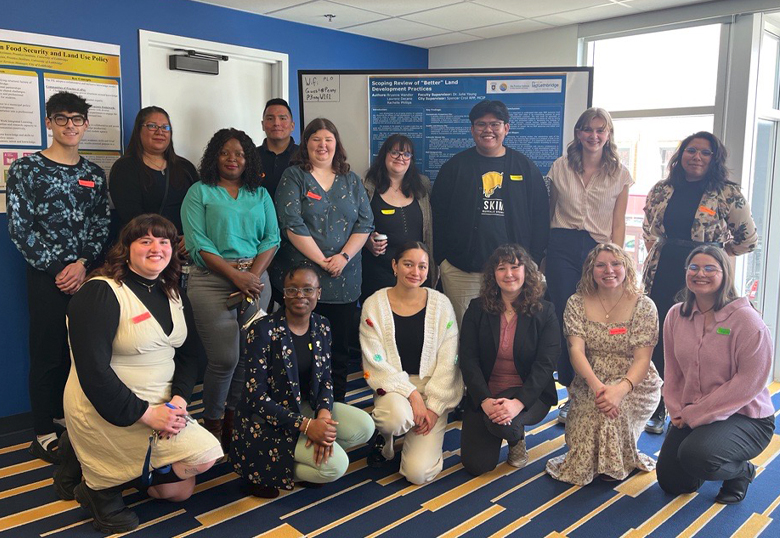University of Lethbridge students continue to make valuable contributions to the City of Lethbridge through applied studies projects thanks to a work-integrated-learning (WIL) partnership between the City and the University of Lethbridge’s Prentice Institute for Global Population and Economy. Now in its second year, the partnership has grown to encompass a variety of projects, from studying the best practices of artificial intelligence on communications and public engagement, to exploring planning policy implementations related to the City’s Land Use Bylaw Renewal project, and assessing the economic, social and cultural impact of post-secondary students on the community.

This partnership is now one piece in the broader City Scholars program established by the city to promote a range of WIL opportunities for post-secondary students from both the University and Lethbridge College. The City Scholars program successfully taps into the knowledge of students eager to put their course studies to work in an applicable setting while also allowing students to gain valuable skills working with a municipal government and solving real-world problems. It also creates pathways to future employment opportunities.
"The city is thrilled to be able to work with student talent across two world-class post-secondary institutions. University and college students bring new insights, diverse ways of knowing and learning, and creativity to support staff with applied research projects. The research that students complete helps ensure that we are designing and delivering programs, plans and services to meet the needs of our diverse community. As a college and university town, it is vital that we build bridges for students to be more engaged in the community," says Perry Stein, Partner Services Manager, City of Lethbridge.
Andrea Cuéllar, Associate Director of the Prentice Institute, notes that this second year of collaboration with the city has opened the doors to working with Lethbridge College.
"The first joint project will be a Policy Innovation Lab in May 2024. Under this novel WIL model, students from the University and the college will work together on the topic of urban food security to inform the city’s Land Use Bylaw renewal project," she says. “The Policy Innovation Lab puts into sharp relief how work integrated learning is not just about placing students in experiential opportunities, it is, importantly, about building impactful inter-institutional partnerships. High-quality WIL opportunities are bound to develop from that.”
On Tuesday, Apr. 9, the City Scholars Student Symposium was held at the Foster James Penny Building where many of the participating students were able to talk about their projects and showcase the results of their work experiences to a lively audience from the city, the University and the college:
- Amy Cran, Taylor Manns and Sydney Whiting presented on WIL and labour market outcomes.
- Lawrenz Decano, Rachelle Phillips, and Bryanne Wandler presented a tool to guide land development practices, which industry professionals can utilize, contextualize, and implement in their projects.
- Erica Gonzalez presented on the Policy Innovation Lab, a novel WIL model that will explore urban food security through the lens of the Land Use Bylaw renewal project.
- Mick Jacobs presented on WIL opportunities for fine arts students.
- Hannah Laberge, Wezi Mutambo, Sydney Whiting and Brie Wilson presented on best practices to inform the Land Use Bylaw Renewal project.
- Hannah Laberge and Brie Wilson presented on a tool that examines the effects of consolidating business and industrial districts to improve planning policy implementation.
- Oluwanifemi Oladoye presented on AI-powered systems to streamline public feedback and to promote collaboration between city officials and residents.
- Morgan Resler and Wynonna Smith presented on project management best practices with the University's Dhillon School of Business and Niitsitapi Centre of Excellence.
- Louisa Seitz presented on current policies for asphalt-applied artworks with the City's Public Art Committee.
- Kes Soup presented on the adoption of AI technology in public service settings.
- Mercy Trinh presented a plan to facilitate inclusion in the City's hiring process, aligned with the principles of Inclusion, Diversity, Equity, and Accessibility (IDEA).
- Brie Wilson presented on best practices and recommendations required to redevelop Lethbridge's Chinatown, 2nd Ave S.
Collaborative Course Work Projects:
- University of Lethbridge students engaged in the Bridging Cultures class, exploring the application of a Two-Eyed Seeing for Both Ways Knowing approach to public realm enhancement and Indigenous traditional knowledge projects.
- Lethbridge College students assessed the feasibility of using shipping containers to house local start-up businesses. Three other Lethbridge College cohorts brought together skill sets in architectural animation, interior design, immersive architecture and block modelling, to support ongoing City planning and design projects in the Civic Commons precinct.
At the end of the showcase, three of the students presented a panel in which they discussed their experiences learning at the city and developing new skills in a municipal government setting. These projects were made possible thanks to the support of Career Bridge and funding from the city, the Prentice Institute, Mitacs, the Niitsitapi Circle of Excellence in Work-Integrated-Learning, the Dhillon School of Business and the Faculty of Fine Arts.
